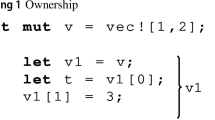Abstract
In this paper, we present a memory management model for the Ravenscar-Java profile. Because of the complexity and run-time overheads in verifying the proper use of the RTSJ’s scoped memory, it is unfavourable in the area of high integrity systems where any unpredictability must be cast out. Our approach maps one anonymous memory area to a user-specifiable method by means of our Java 1.5 annotation types. This straightforward model eliminates single parent rule checks and simplifies other run-time checks that are the main cause of unpredictability and overheads. In fact, it also makes the programmer’s job easier since he/she does not have to worry about creating and maintaining memory areas. All the annotated methods will be automatically converted by a transformer into an RTSJ/Ravenscar-Java compliant version. The semantics of the RTSJ remains the same, meaning that any program in our model when transformed is also a legal RTSJ program. Our key contribution is the definition of a predictable memory model and guidelines that will reduce/eliminate run-time overheads. A bonus to this is a less complicated programming model.
Access this chapter
Tax calculation will be finalised at checkout
Purchases are for personal use only
Preview
Unable to display preview. Download preview PDF.
Similar content being viewed by others
References
Blanchet, B.: Escape Analysis for Java: Theory and Practice. ACM Transactions on Programming Languages and Systems (TOPLAS) 25(6) (November 2003)
Bollella, G., et al.: The Real-Time Specification for Java, http://www.rtj.org
Boyapati, C., et al.: Ownership types for safe region-based memory management in realtime Java. In: Proceedings of the ACM SIGPLAN 2003 Conference on Programming Language Design and Implementation, San Diego, CA, USA (2003)
Burns, A., Dobbing, B., Romanski, G.: The Ravenscar Tasking Profile for High Integrity Real-Time Programs. In: Asplund, L. (ed.) Ada-Europe 1998. LNCS, vol. 1411, pp. 263–275. Springer, Heidelberg (1998)
Cytron, R., et al.: Efficiently Computing Static Single Assignment Form and the Control Dependence Graph. ACM Transactions on Programming Languages and Systems (TOPLAS) 13(4) (October 1991)
Hetcht, H., et al.: Review Guidelines for Software Languages for Use in Nuclear Power Plant Systems, NUREG/CR-6463, U.S. Nuclear Regulatory Commission (1997)
J. Consortium, International J. Consortium Specification: Real-Time Core Extensions, Revision 1.0.14, available at http://www.j-consortium.org
Kwon, J., Wellings, A., King, S.: Ravenscar-Java: A High Integrity Profile for Real-Time Java, in The Concurrency and Computation: Practice and Experience Journal, Special Issue: ACM Java Grande-ISCOPE, Conference, Wiley (2002) (to appear)
Pizlo, F., et al.: Real-Time Java Scoped Memory: Design Patterns and Semantics. In: Proceedings of the 7th IEEE Intl., Symposium on Object-Oriented Real-Time Distribute Computing (ISORC 2004), Vienna, Austria (May 2004)
Sun Microsystems, JSR 175: A Metadata Facility for the Java Programming Language, available at http://www.jcp.org/en/jsr/detail?id=175
Author information
Authors and Affiliations
Editor information
Editors and Affiliations
Rights and permissions
Copyright information
© 2004 Springer-Verlag Berlin Heidelberg
About this paper
Cite this paper
Kwon, J., Wellings, A. (2004). Memory Management Based on Method Invocation in RTSJ. In: Meersman, R., Tari, Z., Corsaro, A. (eds) On the Move to Meaningful Internet Systems 2004: OTM 2004 Workshops. OTM 2004. Lecture Notes in Computer Science, vol 3292. Springer, Berlin, Heidelberg. https://doi.org/10.1007/978-3-540-30470-8_49
Download citation
DOI: https://doi.org/10.1007/978-3-540-30470-8_49
Publisher Name: Springer, Berlin, Heidelberg
Print ISBN: 978-3-540-23664-1
Online ISBN: 978-3-540-30470-8
eBook Packages: Springer Book Archive




